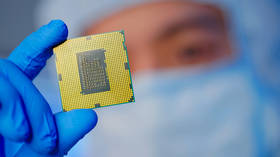Taiwan’s exports plunge amid weak micro-chip demand

The global hi-tech hardware powerhouse, Taiwan, has seen its export orders drop at a record pace amid shrinking demand on semiconductors, the South China Morning Post reported this week, citing data from the country’s Ministry of Economic Affairs.
According to the SCMP report, Taiwan’s orders for overseas shipments in March fell by 25.7% against the same period last year, to $46.58 billion, logging a seventh consecutive month of decline. The March drop was also the sharpest since January 2009, when exports fell amid the global financial crisis at the time.
The country’s orders in March from mainland China and Hong Kong fell by 33.8% year on year, while those from Europe and the US dropped by 33.8% and 20.7%, respectively.
The decline in export orders was led by Taiwan’s consumer electronics sector. The Asian state is the globe’s largest producer of semiconductors, responsible for roughly 60% of the world’s chip supply, and its economy is predictably dependent on its hi-tech industry, with trade in computer chips and other hardware making up some 30% of gross domestic product (GDP). However, orders for consumer electronics in March dropped by 29.4% year on year, while those for information and communication products fell by 26.3%.
Analysts link the slump with the overall drop in demand for consumer electronics, such as PCs and mobile phones, after the Covid-19 pandemic, which saw global sales of these devices soar as people were forced to work from home due to lockdowns. According to market research firm IDC, smartphone shipments worldwide fell by 18.3% year on year in the fourth quarter of 2022, pushed by “significantly dampened consumer demand, inflation, and economic uncertainties.”
Experts warn that unless the demand for semiconductors recovers, Taiwan faces an economic decline in the coming months.
“Unless imports of Taiwanese semiconductor chips by the US and Europe increase, the year-on-year contraction should continue in the first half of 2023,” Iris Pang, chief economist with ING, told SCMP. She noted, however, that the situation could change in the second half of the year if China’s economic recovery speeds up.
“Demand for consumer electronics should rise and, therefore, demand for semiconductor chips should also increase.”
For more stories on economy & finance visit RT's business section












